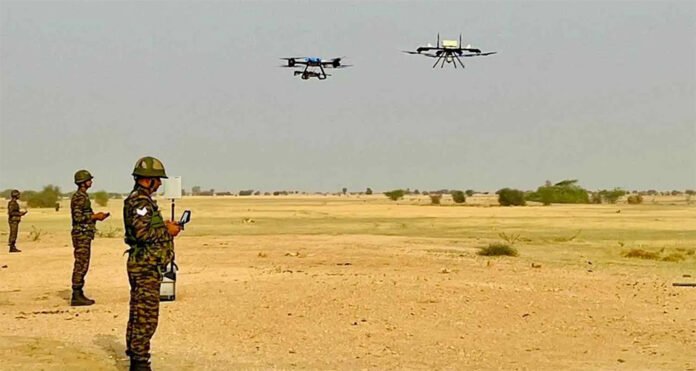New Delhi: The Indian Army has drawn up an ambitious plan to set up 19 state-of-the-art drone training hubs at major training academies and institutions across the country. The move follows Operation Sindoor, which reinforced the central role of drones as standard battlefield assets.
Key establishments such as the Indian Military Academy (Dehradun), Officers Training Academies (Chennai and Gaya), Infantry School (Mhow), and School of Artillery (Deolali) will host these centres. They will become the backbone of a new curriculum where drone handling, operation, and tactics are integrated into the standard training process for officers and soldiers.
The plan envisages procurement of nearly 1,000 drones across categories ranging from nano to medium, supported by about 600 training simulators and allied equipment. These would be distributed across the hubs by early 2026. Nano drones will be used to teach motor skills and manoeuvring basics, micro drones for pilot training and surveillance, while small and medium drones will handle more complex surveillance, reconnaissance, and mission-planning drills.
In addition to 800+ drones across weight classes, around 140 FPV (first-person view) drones will be used for both training and simulation of loitering or kamikaze tactics. Digital FPVs, in particular, will prepare soldiers for real-world operational improvisation under combat stress.
Each drone hub will be equipped with indoor training facilities, 24×7 outdoor manoeuvre ranges, and modern simulation infrastructure, ensuring an immersive training ecosystem. The hubs are intended not only for skill-building but also for certification of personnel across ranks, transforming drones into a standard competency for every soldier.
Procurement is being undertaken through emergency revenue procedures, underscoring the urgency assigned to this initiative. Vendors selected through the limited Expression of Interest (EOI) are expected to supply hardware, simulators, and set up end-to-end infrastructure. They will also conduct dedicated training sessions of 4–6 days at select centres — Deolali, Mhow, Dehradun, and Bengaluru — covering 25 participants at each location.
The implementation timeline is aggressive, with functional hubs expected by January 2026. Vendors will also supply training manuals, maintenance guidance, and instructors to support long-term sustainability of the programme.
The establishment of these hubs marks the execution arm of the roadmap unveiled earlier by the Army Training Command (ARTRAC), which set a target of training every Indian Army soldier in drone operation by 2027. Defence Minister Rajnath Singh has described this initiative as a “game changer” that will redefine battlefield readiness, especially as drones and counter-drone systems are being routinely integrated at battalion level formations.
By institutionalising drone training within premier academies, the Indian Army is shifting towards a future where unmanned systems are treated on par with conventional weapons. This organisational overhaul ensures that drones are not niche specialist tools, but a universal capability for all combat and support arms.





